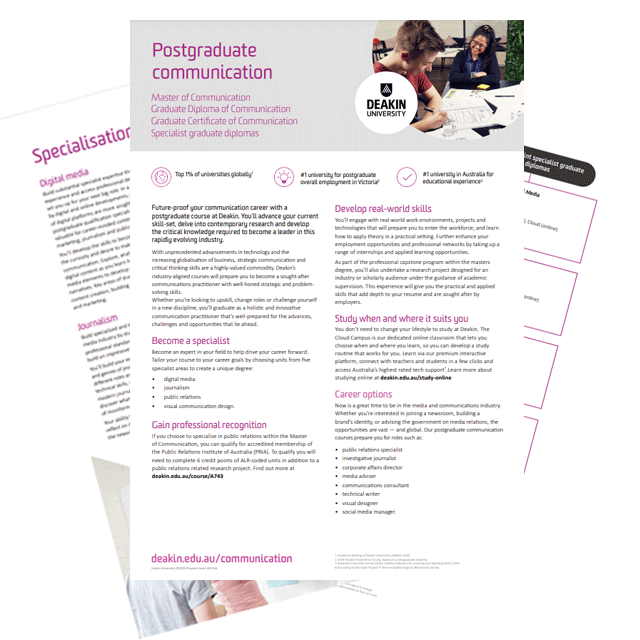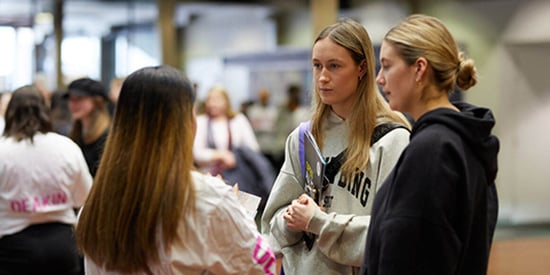Tailor your degree to your own interests
Graduate with PRIA membership^
Start sooner with three intakes a year
Key facts
Duration
2 years full-time or part-time equivalent
Locations
Key dates
Direct applications to Deakin for Trimester 2 2024 close 23 June 2024
Direct applications to Deakin for Trimester 3 2024 close 27 October 2024
Current Deakin Students
To access your official course details for the year you started your degree, please visit the handbook
Course overview
The Master of Communication empowers you to confidently and creatively develop strategic communications that shape opinion.
With a strong focus on evolving technologies, critical thinking and problem solving, you’ll develop the technical skills and knowledge needed to be a future leader in the rapidly changing media and communications landscape.
Advances in technology and the speed of information distribution has made proactive communications experts more sought-after than ever – why not graduate with a degree that puts you ahead of the pack? Whether you’re looking to upskill, change roles or challenge yourself in a new discipline, the Master of Communication will enhance your understanding of the fluid media landscape while training you to be a thought leader and influencer across all sectors in the industry.
Broaden your repertoire of communication skills by working on briefs that simulate the cut and thrust of modern media campaigns, and tailor your degree to your career goals by undertaking intensive study in one of the following specialisations, or choosing to undertake aspects of all of the specialisations:
- Journalism
- Public relations
- Digital media
- Television production
- Visual communication design
Speaking of practical, hands-on learning, you’ll have the opportunity to put theory into practice in world-class facilities with access to a newsroom, TV production facilities (where the Marngrook Footy Show is filmed), sound recording studios and news feeds.
Plus, if you’re a student specialising in public relations, you might be eligible to graduate with PRIA membership, making you even more employable.
Read MoreCourse information
- Award granted
- Master of Communication
- Year
- 2018 course information
- Deakin code
- A743
- CRICOS code?
- 084000E Burwood (Melbourne)
- Level
- Higher Degree Coursework (Masters and Doctorates)
- Approval status
- This course is approved by the University under the Higher Education Standards Framework.
- Australian Qualifications Framework (AQF) recognition
The award conferred upon completion is recognised in the Australian Qualifications Framework at Level 9.
Course structure
To qualify for the Master of Communication, a student must successfully complete 16 credit points of study comprising:
Core Communication Program (4 credits)
Students must complete a common foundation program in contemporary professional communication focusing on key communication concepts and applied research methods, studying these two units in either order, in the first year of study:
- ACX701 Communication Concepts (2 credits)
- ACX702 Applied Research Methods for Communication (2 credits)
Specialisation (8 credits)
Students must complete 8 credits from one specialisation, to provide in-depth knowledge and professional expertise in a sub-field of communication, completing both of the following:
- four one-credit specialisation-specific units selected from one only of five specialisations (Digital Media; Journalism; Public Relations; Television Production; or Visual Communication); and
- a four-credit professional capstone program including a mandatory research project whose topic is relevant to that specialisation
Electives (4 credits)
Students select four electives from any specialisation in the course to create a distinctive degree to advance their professional careers and/or extend their academic knowledge in related areas. Students may complete up to two electives from any equivalent postgraduate course at Deakin University.
Students seeking PRIA accreditation for their degree must complete two electives using units coded ALR unless advised otherwise.
Students are required to meet the University's academic progress and conduct requirements. Click here for more information.Core units
Professional capstone program
Students will either take option A or option B noting that option B requires approval of the Course Director; most students will normally complete option A
Option A
Or
an elective related to the research project where no appropriate internship is available
Option B
(only by approval of Course Director, based on performance in ACX703, and agreement of supervisor)
Specialisations
Refer to the details of each specialisation for availability.
Television Production (Burwood campus only)
Intakes by location
The availability of a course varies across locations and intakes. This means that a course offered in Trimester 1 may not be offered in the same location for Trimester 2 or 3. Check each intake for up-to-date information on when and where you can commence your studies.
Trimester 1 - March
- Start date: March
- Available at:
- Burwood (Melbourne)
- Cloud Campus
Trimester 2 - July
- Start date: July
- Available at:
- Burwood (Melbourne)
- Cloud Campus
Trimester 3 - November
- Start date: November
- Available at:
- Burwood (Melbourne)
- Cloud Campus
Additional course information
Course duration - additional information
Course duration may be affected by delays in completing course requirements, such as accessing or completing work placements.
Mandatory student checks
Any unit which contains work integrated learning, a community placement or interaction with the community may require a police check, Working with Children Check or other check.
Participation requirements
Reasonable adjustments to participation and other course requirements will be made for students with a disability. Click here for more information.
Work experience
Elective units may provide the opportunity for Work Integrated Learning experiences.

Take the next step to a brighter future
Kickstart your career growth. We'll prepare you for the career you've always wanted.
Download course guideEntry requirements
Recognition of prior learning
The University aims to provide students with as much credit as possible for approved prior study or informal learning which exceeds the normal entrance requirements for the course and is within the constraints of the course regulations. Students are required to complete a minimum of one-third of the course at Deakin University, or four credit points, whichever is the greater. In the case of certificates, including graduate certificates, a minimum of two credit points within the course must be completed at Deakin.
You can also refer to the Credit for Prior Learning System which outlines the credit that may be granted towards a Deakin University degree and how to apply for credit.
Fees and scholarships
Fee information
Learn more about fees and your options for paying.
The available fee places for this course are detailed above.
Tuition fees are determined by your enrolment:
- If you are offered a full fee paying place, your tuition fees are calculated based on your course.
- If you are offered a Commonwealth supported place, your tuition fees are calculated depending on the units you choose. Not all courses at Deakin have Commonwealth supported places available.
The 'Estimated tuition fee' is provided as a guide only based on a typical enrolment of students completing the first year of this course. The cost will vary depending on the units you choose, your study load, the length of your course and any approved Credit for Prior Learning.
* One year full-time study load is typically represented by eight credit points of study. Each unit you enrol in has a credit point value. The 'Estimated tuition fee' is calculated by adding together 8 credit points of a typical combination of units for your course.
You can find the credit point value of each unit under the Unit Description by searching for the unit in the Handbook.
Learn more about fees and available payment options.
FEE-HELP
You may be eligible for the Government's FEE-HELP scheme. This scheme covers your tuition fees and can help make studying significantly more affordable.
It's similar to HECS-HELP, but designed for full-fee place courses. It doesn't matter how much you earn, you may still be eligible for FEE-HELP.
FEE-HELP calculator
What is FEE-HELP?
FEE-HELP loans cover up to 100% of tuition fees for eligible students. By taking out a FEE-HELP loan, the government pays your tuition fees directly to Deakin, and the balance is repaid from your employment income - but only once you're earning over $51,550.
Please note: fees shown by the calculator are indicative only and based on 2024 rates. Actual fees may vary. We advise confirming fees with Prospective Student Enquiries prior to enrolment.
Estimate your FEE-HELP
FEE-HELP payments
per pay cycle
Take-home pay
after FEE-HELP and tax
per pay cycle
Your estimated FEE-HELP repayments
- $* is the estimated full cost for a Master of Communication (16 credit points), based on the 2024 fees.
- is the annual FEE-HELP payment, based on your current salary
- of your current salary be spent on FEE-HELP
*Disclaimer
Deakin University (Deakin):
- gives no warranty and accepts no responsibility for the currency, accuracy or the completeness of the information provided;
- advises users that no reliance should be placed upon on the information provided, and;
- instructs users that they should confirm the actual course fee with Prospective Student Enquiries prior to enrolment.
This tool provides indicative information about the fees that will be payable in respect of courses and subjects offered to prospective students domiciled in Australia during the periods indicated.
Please note that the fees shown by the calculator are indicative only and actual fees may vary. Users are advised to confirm the actual course fee with Prospective Student Enquiries prior to enrolment.
The estimated course fee is based on the tuition fee costs applicable to a domestic full time student commencing the course in Trimester 1 and studying full time for the duration of the course but:
- does not include non-tuition costs that may apply, such as Student Services and Amenities Fees (SSAF);
- does not take into account any scholarships or bursaries awarded to the student (including the 10% Deakin alumni discount);
- assumes the maximum number of units that need to be successfully completed actual number completed may be reduced if recognition of prior learning is granted;
- assumes that no exceptional, or non-typical, circumstances apply to the proposed course of study;
- assumes that the options that the user selects are appropriate for the course of study that they intend to undertake;
- where fees are estimated for future years those fee will be subject to annual increases in accordance with increases in the cost of course delivery.
Scholarship options
A Deakin scholarship might change your life. If you've got something special to offer Deakin – or you just need the financial help to get you here – we may have a scholarship opportunity for you.
Postgraduate bursary
If you’re a Deakin alumnus commencing a postgraduate award course, you may be eligible to receive a 10% reduction per unit on your enrolment fees.
Apply now
Some of our courses have limited places available - for the latest on courses still open for application, visit Courses by trimester.
Create an account in the Deakin Application Portal, start your application, enter personal details, education experience, upload supporting documents and submit. Need help? Play this video, or contact one of our friendly future student advisers on 1800 693 888 or submit an online enquiry.
For more information on the application process and closing dates, see the How to apply webpage. If you're still having problems, please contact us for assistance.
Research Information
Students will undertake a practice-based research methods and design unit worth 2 credit points and a significant independent research project worth 4 credit points resulting in the completion of a major creative work and exegesis. A two credit point research project option is available.
Contact information
Arts and Education Student Services and Enrolment Enquiries
Burwood (Melbourne)
Tel 03 9246 8100
artsed@deakin.edu.au
Cloud (online)
Tel 03 5227 1359
artsed@deakin.edu.au
Careers
Want a degree that’s more than just a qualification? Our industry connections, world-class facilities and practical approach to learning are just some of the reasons why Deakin students graduate confident and ready to thrive in the jobs of tomorrow.
Career outcomes
The diverse skill set you’ll develop throughout your Master of Communication can take you just about anywhere, from media agencies and newsrooms, to publications and government organisations. You may even choose to be a consultant, or freelance from your favourite place in the world.
Your degree will prepare you for a variety of roles, including:
- PR practitioner
- Media adviser
- Journalist
- Communication officer or coordinator
- Communication consultant or manager
- Producer - Project officer in government
- Technical writer - Content writer or developer
- Social media specialist
Not everyone knows where they’ll be in five or ten years time. We’ll train you to be flexible throughout your career by placing a greater emphasis on transferable skills - like strategic communication, critical thinking and social responsibility - that make you a more valuable prospect.
That means if your passions change in the future, you’ll feel confident and well-equipped to make your move.
Professional recognition
PRIA membership is available to graduates who specialise in public relations and complete a PR-related research project.
Find out more at Public Relations Institute of Australia.
Course learning outcomes
Deakin's graduate learning outcomes describe the knowledge and capabilities graduates can demonstrate at the completion of their course. These outcomes mean that regardless of the Deakin course you undertake, you can rest assured your degree will teach you the skills and professional attributes that employers value. They'll set you up to learn and work effectively in the future.
| Deakin Graduate Learning Outcomes | Course Learning Outcomes |
| Discipline specific knowledge and capabilities | Acquire advanced and integrated understanding of one or more complex knowledge domains relating to professional communication Demonstrate expert knowledge and specialist skills in contemporary communication methods, and their application in one or more specialist areas of communication including Journalism, Professional Writing, Public Relations, Television Production and Visual Communication Design and in scholarly contexts |
| Communication | Use specialist cognitive and technical skills in communicating ideas, problems and arguments in a variety of modes in a range specialist areas of communication and in scholarly research |
| Digital literacy | Acquire specialist skills in generic and specific digital technologies used to address a range of communication needs in research and professional contexts and for diverse audiences within and outside the communications industry |
| Critical thinking | Acquire expert cognitive skills in the analysis and critical evaluation of communications theory and its application in professional practice and scholarship Demonstrate the ability to evaluate complex ideas, develop appropriate methodologies and communicate conclusions in the context of professional decision making and scholarship |
| Problem solving | Use expert and specialised knowledge of and skills in communications to identify, investigate, analyse and synthesise complex information, problems and concepts and develop creative solutions in professional practice and scholarly contexts |
| Self-management | Employ high level autonomy, accountability and initiative in responding creatively to new situations in professional practice and/or in the completion of a substantial research –based project |
| Teamwork | Demonstrate initiative and accountability in working and learning collaboratively in professional communications practice and scholarly contexts |
| Global citizenship | Acquire high level understanding and the ability to reflect on issues in communications in both domestic and global contexts as a scholar and in professional practice, taking into consideration cultural and socio-economic diversity, social and environmental responsibility and the application of the highest ethical standards |
| Approved by Faculty Board November 2017 | |
Events Explore more events
Footnotes
** QS World University Rankings by Subject 2020




